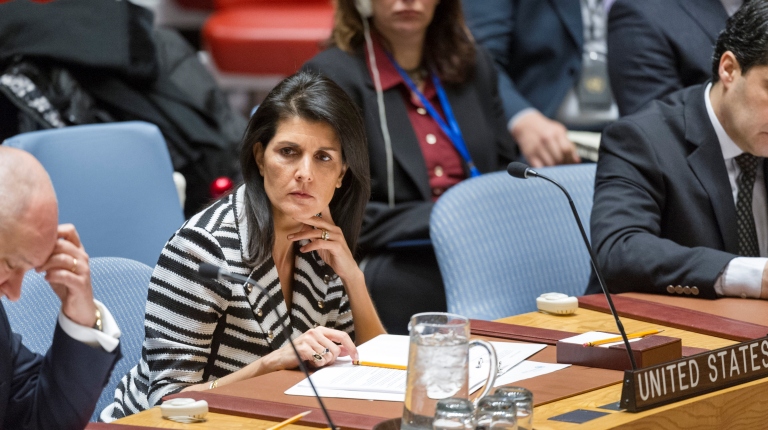UN Security Council likely to slap sanctions on senior S. Sudan officials

May 26, 2018 (WASHINGTON) – United Nations Security Council is expected next Thursday to impose sanctions on the South Sudanese government, officials including Defence Minister and Minister of Cabinet Affairs who chairs the government delegation to the peace revitalization forum.
Also in the same meeting of 31 May, the 15-member body will adopt a resolution renewing the measures related to targeted sanctions in order to support the search for an inclusive and sustainable peace in South Sudan.
The United States which is the penholder on South Sudan circulated a draft resolution on 25 May at an informal meeting. The adoption requires nine Yes votes out of the 15 total votes.
The draft resolution seen by Sudan Tribune provides to renew until 31 May 2019 the targeted sanctions including ban travel and asset freeze, to extend until 30 June 2019 the mandate of the Panel of Experts and to impose sanctions on five officials from the government and one from the rebel side.
According to the draft resolution the list includes SPLM-IO Governor of Bieh State Koang Rambang Chol, Kuol Manyang Juuk South Sudan Defence Minister, Malek Reuben Riak Rengu, Deputy Chief of Defence for Logistics in South Sudan’s army, Martin Elia Lomuro, Minister of Cabinet Affairs, Michael Makuei Lueth Minister of Information and Gen Paul Malong Awan Former SPLA Chief of Staff sacked by Kiir in May 2017.
Awan, Lueth and Rengu are already blacklisted by the U.S. administration for their roles in destabilizing South Sudan.
For the rebel commander, Chol is sanctioned for ordering to restrict the movement of humanitarian workers. “He was responsible for the detention of two (Kenyan) pilots delivering aid, obstructing their humanitarian activities” last February.
The resolution said the head of the government negotiating team Lomuro “threatened members of the press, obstructed humanitarian missions, and threatened to eliminate the Ceasefire and Transitional Security Arrangements Monitoring Mechanism (CTSAMM). Lomuro also obstructed the activities of UNMISS”.
Regarding the defence minister, the draft resolution says under his command the army violated the ceasefire of December 2017 by attacking civilians. But also the SPLA expanded or extended the conflict through offensives in Pagak.
The resolution further says the South Sudanese defence minister supplied the Sudanese rebel of the SPLM-N with military equipment in violation of the 2015 peace agreement.
LOBBYING SECURITY COUNCIL
The Deputy head of the South Sudan mission to the United Nations told Juba in a note dated on 25 May the Security Council would likely adopt the resolution.
“From the way some members of Security Council spoke during the Panel of Experts report, the draft will likely pass as the penholder only requires 9 yes votes out of the 15 total votes,” said the south Sudanese diplomat in its note seen by Sudan Tribune.
The diplomat advised to reach out China and Russia asking them to use their veto vote.
She further recommended that Juba lobbies the Council members in a way to prevent the penholder, the United States from getting the nine votes required to pass the resolution.
So, the note recommended to particularly contact two African non-permanent members of the Council- Cote d’Ivoire and Equatorial Guinea – to request them to abstain during the vote. The two countries reportedly are in favour of the targeted sanctions.
Also, it considered good to reach the other non-permanent countries including Bolivia, Ethiopia; Kazakhstan, Kuwait, Netherlands, Peru, Poland and Sweden to convince them to not support the draft resolution.
In a recent interview with the VOA, Brian Shukan, director of the office of the U.S. Special Envoy for South Sudan said they want to impose sanctions on individuals seen to be blocking the peace process.
“We have taken an approach using sanctions where we want to apply pressure and also to hold people accountable,” said Shukan.
Also, UK special envoy for Sudan and South Sudan Christopher Trott approved the approach.
“We are in the process of looking [for] ways in which we can introduce sanctions on individuals, both for corrupt practices and for obstructing the peace process,” he told VOA.
(ST)
